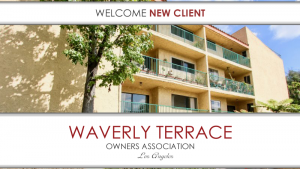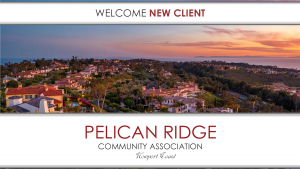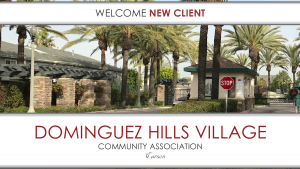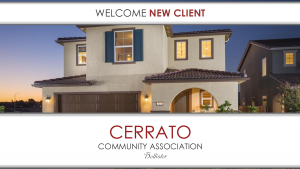 Since COVID-19, followers of the real estate market may have noticed that the housing market is currently booming. There are not as many sellers as there are buyers, so the competition to obtain a buyer’s dream home is through the roof. Many of these potential buyers are looking to buy their next home within a community association (“HOA”). The competition to buy homes creates an increase in the number of questions from real estate agents and mortgage/escrow companies that are directed toward the association and its agents regarding any litigation involving the association. What should the Board and manager be aware of? What should they do in certain situations?
Since COVID-19, followers of the real estate market may have noticed that the housing market is currently booming. There are not as many sellers as there are buyers, so the competition to obtain a buyer’s dream home is through the roof. Many of these potential buyers are looking to buy their next home within a community association (“HOA”). The competition to buy homes creates an increase in the number of questions from real estate agents and mortgage/escrow companies that are directed toward the association and its agents regarding any litigation involving the association. What should the Board and manager be aware of? What should they do in certain situations?
The HOA has no legal obligation to make disclosure to buyers of properties within the HOA or other third parties. These third parties may be real estate agents, loan processors, escrow companies, or anyone else looking for information regarding the HOA and is not an HOA member.
Even though the HOA has no legal obligation to make disclosures, its management company and even its Board will be asked numerous times by third parties to provide further information regarding any pre-litigation matter or lawsuit the HOA is engaged in. Some typical questions are:
-
-
- Can the HOA or management provide a copy of the complaint?
- Can the HOA provide certain certifications or expert documentation?
- How much money is the HOA and/or management being sued for?
- Would the anticipated or known damages and legal expenses be expected to exceed some percentage of the HOA’s reserve fund?
- Can the HOA’s attorney provide an opinion that any award granted in the lawsuit will be covered under the HOA’s master insurance policy?
- When will the matter be resolved and will it be resolved in the HOA’s favor?
-
Sometimes, these third parties will require that the answer to the above questions come from the HOA’s legal counsel. In any case, neither the HOA’s Board, nor its managing agent, or any of its agents (including legal counsel) should answer any of the above questions. If legal counsel is handling the matter, they should prepare a disclosure letter that the HOA may use to present to any third parties requesting further information. In addition to not answering any of the questions above, the disclosure letter should also not contain any predictions or conclusions. The more vague the better, as the disclosure letter is meant to be an official tool to block further communication from third parties. If applicable, the disclosure letter will provide the appropriate contact information if the HOA’s insurance carrier picked up the case and assigned insurance defense counsel and an adjuster. If the HOA and its managing agent need help navigating this scenario, they should direct all questions to its legal counsel.
If a homeowner wants more information regarding any pre-litigation or lawsuit in order to refinance their home, and the pre-litigation or lawsuit is not resolved, no material or information should be disclosed beyond the fact that things are in progress. The general disclosure letter may be provided to the homeowner. The HOA is not obligated to assist homeowners in refinancing and should not if the information being requested is privileged (confidential).
Any questionnaire sent to the HOA or its managing agent should be forwarded to legal counsel for analyzation. The questionnaire should not be filled out and returned without legal counsel’s input as any disclosures might create unwanted liabilities for the HOA.
| While evading questions from homeowners and third parties might seem frustrating, such action is a necessity. Pre-litigation and the proceedings of a lawsuit do not guarantee any outcome. The HOA and its managing agent should know that homeowners and third parties will be very aggressive in trying to obtain further information. However, the best course of action would usually be to: (1) direct the matter to the HOA’s legal counsel; (2) provide the disclosure letter; and (3) indicate, in some fashion, that there is no further information at this time as the matter is ongoing or in the process of being resolved (descriptions will vary depending on each scenario). |
 HOA Lawyer Blog
HOA Lawyer Blog


 It’s our privilege to welcome Canyon Crest Estates Homeowners Association to Tinnelly Law Group’s growing family of HOA clients.
It’s our privilege to welcome Canyon Crest Estates Homeowners Association to Tinnelly Law Group’s growing family of HOA clients. It’s our privilege to welcome Waverly Terrace Owners Association to Tinnelly Law Group’s growing family of HOA clients.
It’s our privilege to welcome Waverly Terrace Owners Association to Tinnelly Law Group’s growing family of HOA clients. There will come a time when a homeowner violates an association’s
There will come a time when a homeowner violates an association’s  It’s our privilege to welcome Pelican Ridge Community Association to Tinnelly Law Group’s growing family of HOA clients.
It’s our privilege to welcome Pelican Ridge Community Association to Tinnelly Law Group’s growing family of HOA clients. It’s our privilege to welcome Links Pointe Homeowners Association to Tinnelly Law Group’s growing family of HOA clients.
It’s our privilege to welcome Links Pointe Homeowners Association to Tinnelly Law Group’s growing family of HOA clients. When a delinquent homeowner dies, there is a strict one-year statute of limitations to sue them or to continue a lawsuit against their estate. (Cal. Code Civ. Proc. § 366.2). This is true even if the statute of limitations would have been longer had the person survived. This harsh rule applies even if you did not know that the person died so Boards and management should take notice if a homeowner does not respond to communications or suddenly falls in arrears and then investigate further by contacting family members or emergency contacts during circumstances of non-responsiveness and/or extended non-payment.
When a delinquent homeowner dies, there is a strict one-year statute of limitations to sue them or to continue a lawsuit against their estate. (Cal. Code Civ. Proc. § 366.2). This is true even if the statute of limitations would have been longer had the person survived. This harsh rule applies even if you did not know that the person died so Boards and management should take notice if a homeowner does not respond to communications or suddenly falls in arrears and then investigate further by contacting family members or emergency contacts during circumstances of non-responsiveness and/or extended non-payment. It’s our privilege to welcome Dominguez Hills Village Community Association to Tinnelly Law Group’s growing family of HOA clients.
It’s our privilege to welcome Dominguez Hills Village Community Association to Tinnelly Law Group’s growing family of HOA clients. It’s our privilege to welcome Cerrato Community Association to Tinnelly Law Group’s growing family of HOA clients.
It’s our privilege to welcome Cerrato Community Association to Tinnelly Law Group’s growing family of HOA clients. The rising cost of electricity, environmental considerations, clean energy and tax savings, utility company programs designed to help alleviate the demand on the grid, and the proliferation of affordable residential solar energy systems have made solar power more popular than ever. Consequently, Associations are seeing a sharp rise in homeowner requests to install solar energy systems. This presents a particularly unique set of challenges for condominium developments because of their shared roofs and other similar common area components.
The rising cost of electricity, environmental considerations, clean energy and tax savings, utility company programs designed to help alleviate the demand on the grid, and the proliferation of affordable residential solar energy systems have made solar power more popular than ever. Consequently, Associations are seeing a sharp rise in homeowner requests to install solar energy systems. This presents a particularly unique set of challenges for condominium developments because of their shared roofs and other similar common area components.